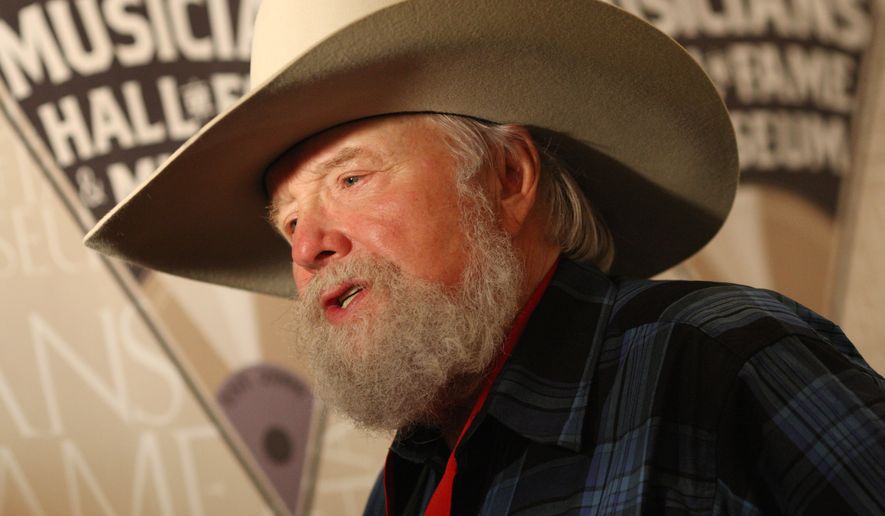Charlie Daniels truly needs no introduction. As leader of his namesake band, the North Carolina native was instrumental in bringing country music into both rock and pop audiences. His string of hits included “In America,” “Long Haired Country Boy” and “The South’s Gonna Do It Again.” There isn’t a music fan alive not familiar with his biggest song, the greatest country rock crossover hit ever, “The Devil Went Down to Georgia.” The man sure can fiddle.
Aside from touring the world more times over and selling millions of records, Mr. Daniels has always found time to give back. Since 1974, his yearly “Volunteer Jam” benefit concert has raised a pile of cash and featured the biggest names in rock and country. This year, for the 40th anniversary show at Bridgestone Arena in Nashville, Tennessee, on Aug. 12, Mr. Daniels and his band will be joined by Trace Adkins, Ted Nugent, Tracy Lawrence, The Oak Ridge Boys, Travis Tritt, Billy Ray Cyrus and dozens more.
The always-outspoken Mr. Daniels checked in to discuss the Confederate flag controversy and his upcoming concert.
Question: Do you still love playing live?
Answer: As much as ever. I’ve got the best band I’ve ever had. They push me every night. Their musicianship pushes me to be better and better. A man needs an interest and a challenge in his life. I have both.
Q: Where do you stand on the Confederate flag issue?
A: The Confederate flag to me is a geographic thing. It doesn’t represent any political philosophies, doesn’t stand for any type of oppression or anything like that. It is, and always has been, to me a banner of where I’m from. Just like state flags. I have never considered it anything other than that.
The problem with what’s going on is you attack the symbolism, because that is a thing you can control. But you don’t go after the things that caused the problem that you can’t control. It’s just like gun control. They think, “Well, we’ll just take everybody’s guns away, and that will solve it.” That’s a bunch of crap.
Same with the Stars & Bars. To me, it doesn’t mean any of that stuff. To other people? Somebody else? Maybe it does. I lived through the Second World War, and personally, I would never put up a swastika. I can certainly see how somebody would be offended by that. And I would be offended by that because [of] what it represents.
But the Confederate flag just represents a geographical part of the country.
Q: Did you hear that TV Land pulled “The Dukes of Hazzard” off the air because the car has the flag on its roof?
A: Ridiculous! It’s just overreaction. And the thing is, you’re not attacking the problem at all. In fact, you’re alienating people instead of bringing people on to the side that should be leading things and leading the cause. You’re bringing people like Al Sharpton in with his crap.
People who see the flag in a similar fashion to the way I do are offended by that. You’re going to ban “Dukes of Hazzard” because the car has a Confederate flag on it and is called the General Lee? Robert E. Lee was one of the most honorable men who ever lived. So ridiculous.
The thing is, once you get it done, you’ve done nothing. You still have the problem that you had. You have wasted all this energy on symbolism, and you don’t accomplish anything.
Q: You have your benefit concert Volunteer Jam 40th coming up. How did the first Volunteer Jam concert come about in 1974?
A: It started as a live recording session for the album we were doing called “Fire on the Mountain.” We had two songs we wanted to do live. We did the studio part of the album in Macon, Georgia. For the live part, the only place you could draw a decent crowd for a live recording was in Nashville. We booked a small 2,400-seat memorial auditorium. I casually invited some of my musician friends to come up and have a big jam.
The show sold out. The Marshall Tucker Band guys came. Dickey Betts from Allman Brothers Band came. It got to be the most talked-about thing in town. The next year, we moved it from a 2,400-seat theater to a 13,000-seat place.
It went on for 20 or so years. This was before Band Aid and Farm Aid. It got to the point that so many people were doing these types of shows that it was hard to attract a meaningful roster of talent. So we laid it aside. This year, being the 40th anniversary, we decided we would bring it back.
Q: Where does the money raised go to?
A: The money goes to the Journey Home Project. It is an organization set up to try and soften the landing for people coming back from combat, to help them adjust back to civilian life after military service. Whatever the need happens to be.




Please read our comment policy before commenting.